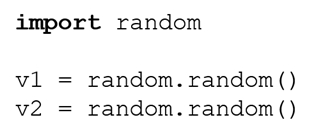Assuming that the code below has been executed successfully, which of the following expressions will always evaluate to True? (Choose two.)

Assuming that the code below has been executed successfully, which of the following expressions will always evaluate to True? (Choose two.)

Given the code snippet, random.random() generates a random float number in the range [0.0, 1.0), which means it is always less than 1. Therefore, the expression v1 < 1 will always evaluate to True. Additionally, random.choice([1,2,3]) selects a random element from the list [1, 2, 3], all of which are greater than 0. Therefore, the expression random.choice([1,2,3]) > 0 will also always evaluate to True. The option v1 == v2 is not correct because v1 and v2 will be different most of the time due to the nature of generating random numbers. Finally, len(random.sample([1,2,3],1)) > 2 is incorrect because random.sample([1,2,3],1) always returns a list of one element, making its length 1, which is not greater than 2. Therefore, the correct answers are B and C.
B. v1 < 1 C. random.choice([1,2,3]) > 0
random.random() returns a float that is greater than 0 but less than 1. v1 = random.random() v1 will always be less than 1 So B is True random.choice([1,2,3]) returns 1,2, or 3. which is always greater than 0. C is True
B & C >>> import random >>> v1 = random.random() >>> v2 = random.random() >>> print(v1) 0.17779831894224019 >>> print(random.choice([1,2,3])) 1 v1 will always be less than 1 random choice will always be one in the list and greater than 0
Ans A, as v1 = 0.054095873573811515, v2 = 0.8975891098469417. So v1 != v2. Then, return False Ans B, v1 =0.054095873573811515. so v1< 1. Then, return True Ans C, random.choice([1,2,3]) = 1. So 1 >0. Then, return True Ans D, len(random.sample([1,2,3],1)) = 1. So 1 < 2. Then, return False Correct Answer should be B and C